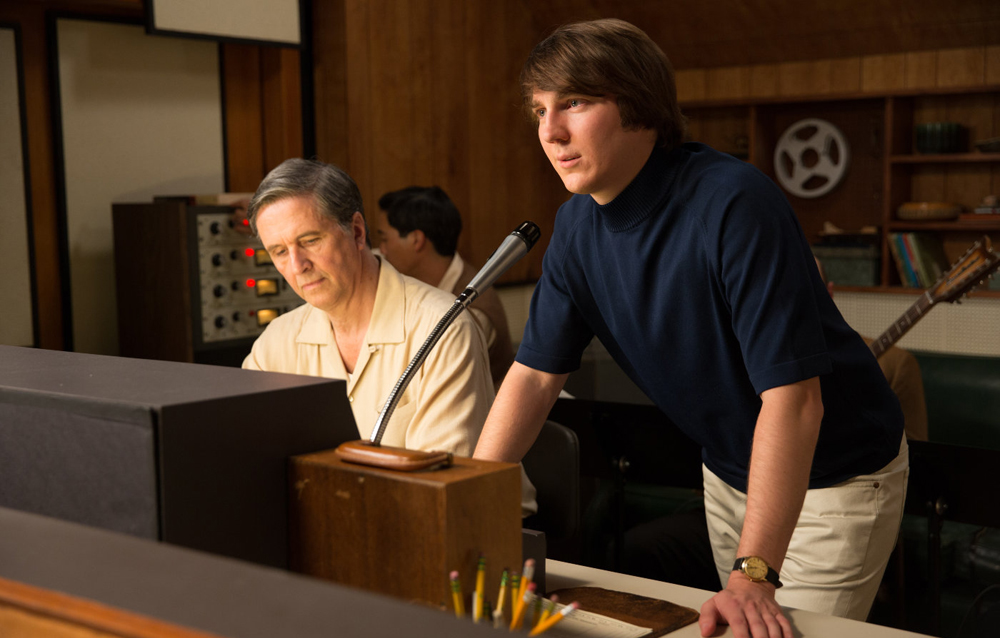“Love & Mercy” is a film that for any number of reasons shouldn’t work. For starters, movies about creative geniuses rarely capture what it is that makes them special while usually sanitizing them at the behest of the subject or his or her estate that has given the production their life rights. In the case of Brian Wilson, that task seems even more daunting for a magician of sound who even before drugs clouded his memory never seemed to be able to explain how he could create what feel like auditory portals into other dimensions. Yet as soon as the first frame of Bill Pohlad’s chronologically criss-crossing biopic of the Beach Boys leader hits the screen, an image of black awash in the sonic experimentation that begins to resemble something familiar as the bones of “Good Vibrations” and other hits strikingly emerge, you know you’re in good hands.
Balancing the transcendence of Wilson’s accomplishments with the struggle the musician faced both with his own demons and those eager to prey on him in his weakened state, Pohlad and screenwriter Oren Moverman (“Rampart”) manage to find both a compelling narrative and a raw look at the burden of creativity without pulling any punches. But it’s fitting that the two-pronged tale, which documents a younger Wilson (Paul Dano) finding his distinctive sound working on the “Smile” album during the 1960s and an older one (John Cusack) reclaiming his identity after ceding his autonomy to a dangerous doctor (Paul Giamatti), also features the story of a strong woman who helps Wilson realize his full potential…actually, two, if you count Melinda (played in a fierce turn by Elizabeth Banks), who helps Wilson see his life for what it really is after the two meet at a car dealership, ultimately becoming his wife.
However, the other is Claire Rudnick Polstein, who as president of the motion picture division of John Wells Production, shepherded “Love & Mercy” to the screen over many years, ensuring the end result would honor Wilson and Melinda’s story while preserving an approach to it that was every bit as innovative as its subject. With Wells, the prolific TV producer who has redefined himself in recent years as a director of prestige movies with “The Company Men” and “August: Osage County,” she has championed such projects which go against the grain of contemporary studio thinking – dramas that don’t appear to be watered down either for commercial concerns or the tightened budgets that have become the norm for such films.
In the midst of a barnstorming tour across the country with a stop in Austin for its U.S. premiere at SXSW in March after a triumphant bow at Toronto last year, Rudnick Polstein spoke about the long haul of bringing “Love & Mercy” to the big screen and the challenge of staging what essentially amounted to two separate productions to recreate two eras in Wilson’s life, her move from being an executive at New Line during their heyday in the late ‘90s/early ‘00s to being a producer and why great characters are at the heart of what she does.

I worked for John for a few years, and it had come to us through Warner Independent. Their option was up, and they were looking for someone to come in and help produce it because they really loved it. We picked up the option, but then Warner Independent folded. When Warner Independent folded and our option was up, we were looking for a financial partner, and that’s when we went to River Road.
Since River Road is a production company run by Bill Pohlad, was it interesting to have the chief financier of the film also be your director?
I had done that before with John Wells for a film we did called “Company Men,” where John started it, and it was ultimately the Weinsteins who picked it up, but because it was with John doing it, it was easier. Your financial questions get answered right away. For me, I just had blinders on. It was about making the best movie, and Bill was on that same page, so it was definitely a plus.
Were you on the same page creatively from the start?
He had a different way into it, which was interesting, and it worked for the material, and Oren Moverman was such a smart writer. He did such a great job of the transitions and weaving [the two stories] together. Brian and Melinda were on board with it, so there weren’t really any bumps in the road.

To make a movie about someone who’s alive is a big responsibility, and Brian is very much aware and there and in the moment and involved, and Melinda, who unfortunately isn’t here, is the same. So it was really terrific, and they were, I think you guys sensed it in the press conference, incredibly gracious and generous with their time and the story of their life. But it’s, I think, scary for Bill because he didn’t want to mess that up.
Brian would look at [the script], and he is so in love with Melinda, and he would say, “You know, this doesn’t show how in love we are.” That would be a note: “We kissed more.” In the [recording] studio, there were very tiny things that we completely adjusted. Wherever we could, we absolutely did what he asked.
With the two different time periods, was this like making two different movies?
It was really. How we did it is first we shot the ‘60s with Paul, and Paul left, then we shot the ‘80s with everyone else, so we did it in two separate chunks, and they really never intersected. [They informed each other] a little bit because of certain locations we could get and not get and when we could get them and actor availability. It was a lot of juggling. Looking back on it, it just seems so easy, but it was a lot of hair-pulling to make it work as seamlessly as it did.
Was there a particularly crazy day of the shoot?
When we were at the end of the ’60s, beginning of the ‘80s, we had one day when they were all at the beach, which is a little bit in the opening sequence, so that day, we were at Point Dume in the morning, and then we had to move the whole company over to Santa Clarita for where we had the Cadillac in our shot, so it was crazy, just going over the hills. That was one of the craziest days just logistically to get what we needed.

We had a great production designer, Keith Cunningham, and our prop department was amazing. We were so fortunate because all of this [recording] equipment exists still, and collectors have saved it. The mid-century stuff is everywhere. But the house we shot, Marie’s house, was a historical house and we were very lucky that a lot of that still exists. It was a lot of paying attention to detail everywhere. The same with the ‘80s, though ’80s was much easier.
It seems the kinds of movies that are made at John Wells Production are the kind you constantly hear are endangered – the smart, modestly budgeted drama. So what’s the trick to getting them made?
We both have very similar tastes, but I think the key to getting these kinds of movies made is having great material. John comes from the place of characters — great characters — that’s what our mantra is. If you really have that great piece of material with great characters, then it’s not easy, but it makes it a little easier for things to fall into place.
Is it exciting to work at this place that seems to have a bit of a cocoon around it?
Absolutely. I don’t know whether I could come out of it. But for every one that we manage to get made, there’s 10 that don’t. Still, it’s lovely to be able to be able to be very passionate about the movies you want to make and to be in a position where you can be creative. The movies we’re working on now, we have some which are under $10 million that are just passion projects that we loved and are coming together, which will be exciting and difficult and everything else. John is finishing off one now [“Adam Jones”] he did with Bradley Cooper.
After being an executive at New Line, was it an interesting transition to move across the table to being a producer?
It took a little getting used to because as an executive, everyone comes to you with everything all the time, and you hustle in a different way. Being a producer, you really have to be the creator of things and then bring it to other people, so it’s definitely was a little bit of a culture shock and just a different way of thinking, which has been ultimately really gratifying.
Recently, I saw a documentary called “Lost Soul” about the insane making of “The Island of Dr. Moreau,” which I believe was one of your first productions at New Line. Did that prepare you for everything that comes after?
Everything. Everything. [laughs] It was my second movie at New Line. The filmmaker [of “Lost Soul”] had reached out to me to see if he could interview me, but I didn’t really want to go back there. There’s nothing that can happen ever on a movie set that will ever rival what happened there. Nothing bothers me anymore.
“Love & Mercy” opens on June 5th.




